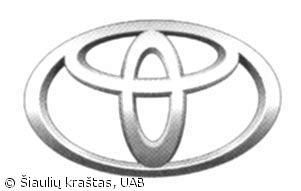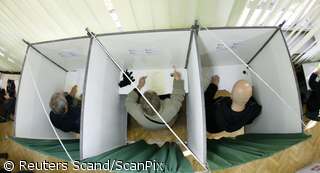Future gangster is "Don Corleone behind a laptop".
Published:
8 September 1999 y., Wednesday
In the next decade, the world_s crime fighters say they will fight international organized crime on several fronts, battling financial fraud, corruption, the sale of human beings for sex and labor and the trafficking of weapons of mass destruction. The focus of a three-day crime-fighting conference at Garmisch-Partenkirchen (Germany) sponsored by the FBI and the George C. Marshall European Center for Security Studies was touted in advance- as an assessment of organized crime_s impact on national security. But the meeting of American, European and Eurasian top brass ended Thursday with little open discussion of such forecasts. Organizers admitted the conference fell short of that objective, but said other goals had been achieved, namely the forging of new East-West relationships between law enforcement officials. One senior U.S. law enforcement official involved in planning the event told APBNews.com it was difficult to get officials from the former Soviet republics to open up and discuss their problems and worries over mobsters operating in their fledgling democracies. Author and criminologist Joseph Albini, of Indiana_s Wayne State University, said he estimates that as early as 2000, more than 90 percent of those involved in organized crime will be computer literate on some level. "The conception of Don Corleone [from the "Godfather" movies] smoking a cigar is better seen as Don Corleone behind a laptop," he said. It is the access to mass media information and the technology boom that are changing the face of mobsters from thugs to super-criminals, Albini said. Kulikov echoed that view. "We are at the threshold of a new millennium. We have to be prepared for the emergence of new types of criminal activity," including technological, he said. The retired Russian general clicked off a number of examples, including trafficking illegal genetically-engineered human organs and crop seeds. A senior intelligence officer from Great Britain who specializes in organized-crime analysis said tomorrow_s gangsters almost certainly will be consumed with electronic commerce, particularly online gambling, credit card fraud and virtual banking, where a financial institution exists solely in cyberspace. Another possibility, he said, is the theoretical notion of virtual-reality narcotics, which assumes it is possible to transmit a digital "stimulant" or hallucinogen across the Internet, creating a new form of addiction. "Biotechnology and information technology are the two biggest revolutions of this century, and we should look at each of them and see where the potential for money is from the criminal point of view," the official told APBNews.com, requesting anonymity.
Šaltinis:
APBNEWS.COM
Copying, publishing, announcing any information from the News.lt portal without written permission of News.lt editorial office is prohibited.
The most popular articles
 Bulgaria's annual Festival of Humour took place today, poking fun at the global recession.
more »
Bulgaria's annual Festival of Humour took place today, poking fun at the global recession.
more »
 The Belgian city of Ghent is going green by urging its residents to eat more greens. Ethical Vegetarian Alternative campaigners want them to go veggie every Thursday They say that if the whole city did that for a year it could save the equivalent carbon emissions of 20,000 cars.
more »
The Belgian city of Ghent is going green by urging its residents to eat more greens. Ethical Vegetarian Alternative campaigners want them to go veggie every Thursday They say that if the whole city did that for a year it could save the equivalent carbon emissions of 20,000 cars.
more »
 Baking is something David Muniz and David Lesniak know a thing or two about.
Originally from the States, the pair moved to Britain two years ago and have been supplying London with their American-style cakes ever since.
more »
Baking is something David Muniz and David Lesniak know a thing or two about.
Originally from the States, the pair moved to Britain two years ago and have been supplying London with their American-style cakes ever since.
more »
 A collection of 16th and 17th century torture devices is up for auction in New York. Judging by some of the items for sale, we've come a long way.
more »
A collection of 16th and 17th century torture devices is up for auction in New York. Judging by some of the items for sale, we've come a long way.
more »
 Despite vigorous efforts, men and women do not always get the same start or benefit from the same opportunities.
more »
Despite vigorous efforts, men and women do not always get the same start or benefit from the same opportunities.
more »
 Across Europe the amount of time new mums can have off after the birth of their child varies from 14 weeks to 2 years.
more »
Across Europe the amount of time new mums can have off after the birth of their child varies from 14 weeks to 2 years.
more »
 As the world No.1 carmaker announced billions in losses, an increasing number of auto industry workers near its Toyota City are hungry and sleeping in tents after losing their jobs and homes.
more »
As the world No.1 carmaker announced billions in losses, an increasing number of auto industry workers near its Toyota City are hungry and sleeping in tents after losing their jobs and homes.
more »
 With a media turnout worthy of a superpower summit in the lobby of Trump Tower in New York City - Donald Trump - the Miss USA pageant owner - decided the fate of Miss California USA Carrie Prejean.
more »
With a media turnout worthy of a superpower summit in the lobby of Trump Tower in New York City - Donald Trump - the Miss USA pageant owner - decided the fate of Miss California USA Carrie Prejean.
more »
 A conversation is taking place across Europe as people use choice boxes to record their questions and comments on what the European Union should be doing ahead of the European elections from 4-7 June.
more »
A conversation is taking place across Europe as people use choice boxes to record their questions and comments on what the European Union should be doing ahead of the European elections from 4-7 June.
more »
 MTV teams up with EU on campaign to encourage young people to vote.
more »
MTV teams up with EU on campaign to encourage young people to vote.
more »